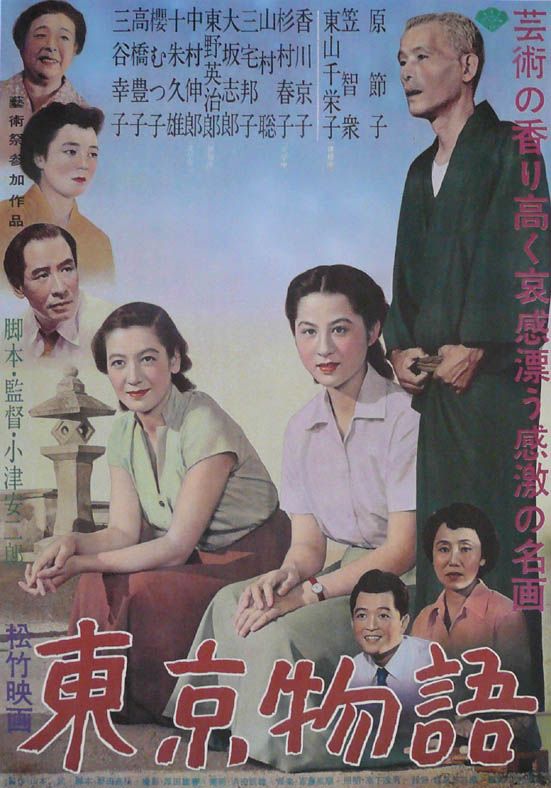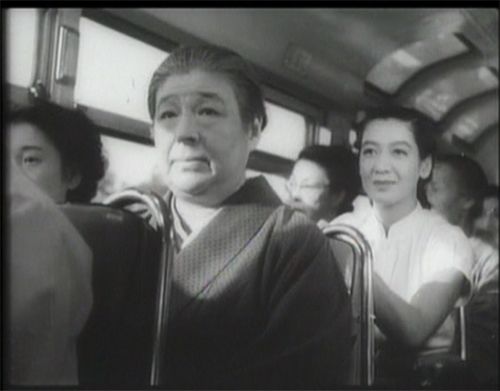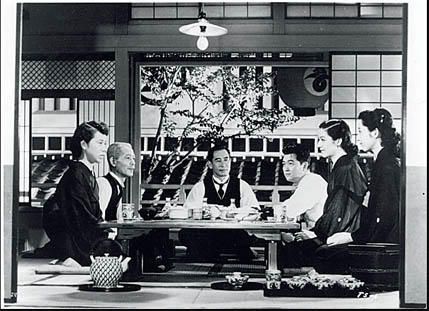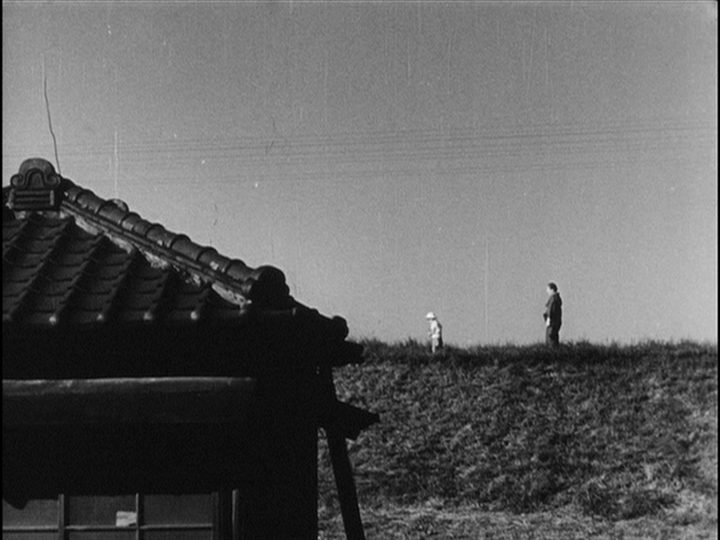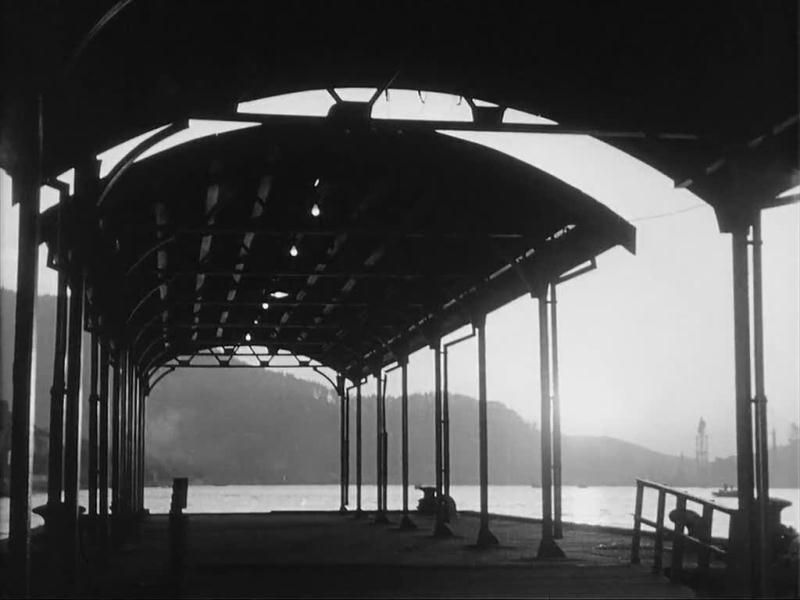Tokyo
Story
1953
Director: Yasujiro Ozu
Starring: Chishu Ryu, Chieko
Higashiyama, Setsuko Hara
Seeing
as how I tend to dislike epics, it makes sense that I tend to enjoy minimalist
cinema. The quiet pacing, the small
scope of the stories, the regular characters – I find this very appealing. Because of this, I fell in love pretty gosh
darn quickly with Japanese cinema of the fifties, as most of it played to these
sensibilities. Having said that, though,
I admit that even Ozu might be a bit TOO minimalist for me.
The
simple story of Tokyo Story is all about family. An elderly couple (Ryu and Higashiyama) live
in an outlying province of Japan, and decide to make the trip to Tokyo to visit
their grown children and their families.
They first stay at their son’s Koichi’s place. Koichi is a small neighborhood doctor, and he
has a wife and two young boys and many demands on his time that always keep him
from spending real time with his parents.
Soon, then, the couple moves to their daughter Shige’s house in
Tokyo. Shige runs a beauty parlor, and
could not make her annoyance at having to accommodate her elderly parents more
clear. But it is Noriko (Hara), the
couple’s widowed daughter-in-law who is most caring and sympathetic, eager to
spend time with her parents-in-law.
And
that’s it. Much less about story and
much more about characters, we focus on events that reveal characterizations of
the people who inhabit the space of the film, and not so much on plot. Simple, ordinary, everyday events unfold
before our eyes and we simply drink it in.
The elderly father gets drunk one night with friends from his
youth. The old couple goes to seaside
resort that turns out to be far too modern for their taste. Noriko takes them on a bus tour of downtown
Tokyo. In each of these simple
anecdotes, we simply observe the players and begin to understand the people we
are seeing.
Perhaps
what I like most about Tokyo Story is how utterly and
heart-breakingly real it is. Given that
the film focuses mainly on the distant relationship between the parents and
their grown children, Ozu is amazingly careful not to paint anyone as too
villainous. The grown children are
hardly likeable, least of all Shige, but there is no denying that Shige is a
real person and not an arch-villain. It
is not as if she sits in her beauty parlor plotting as to how best usurp her
father’s throne and make off with the family treasure. No, she just sighs and huffs and puffs and
complains a bit too much. She is
impatient with her family; and yet, when tragedy strikes, she is sad. Others may, but I do not doubt her
grief. She feels loss just like anyone
else, but Ozu is clear that she despite this, she is still colder and a bit
crueler than everyone else. Shige is
human. Not a terrifically nice human,
but not a criminal mastermind either.
She is real.
And
given that Shige is our most extreme character in terms of villainy, it should
therefore make sense that every other person in the film falls nicely within
the realm of actual existence. The
oldest son seems to look forward to his parents’ visit but immediately ditches
both them and his sons when his work comes up.
The middle son makes jokes and excuses but also expresses guilt at his
dismissal of his parents. Even Noriko,
whose actions border on angelic, has enough in her life to make her less
perfect. Although not mean, her kindness
and sympathy towards her parents-in-law belies a yawning isolation She is not some perfect hero but a very sad,
lonely, and rather poor young widow desperately seeking out some human
contact. She’s sadly real, just like
everyone else.
The
distance with which the children treat their parents is not immediately
evident, something I also quite liked about Tokyo Story. It’s slowly revealed when they ask a few too
many times if Mom and Dad want a bath or want to go to bed early. The grown children don’t really know what to
do with their parents and are unwilling to simply “be” with them. There is no comfortable inhabiting of the
same space; things must be planned in order to avoid awkward silences.
Beyond
the script and the muted performances which allow the viewer to discover the
characters for themselves, there is Ozu.
Ozu’s camera is characteristically static. He wasn’t one for quick zooms or crazy
cuts. In fact, he’s not so much a fan of
zooms or cuts period. Instead, I feel
Ozu was more an architect – he would construct the set and the story for a
scene, then simply sit his camera a few inches off the floor and let it unfold
while the camera captures it. This
technique certainly worked for him, especially for a tale as remarkably
realistic as Tokyo Story. Indeed, his
lack of camera technique helps further to make us believe that what we are
seeing is true.
Another
little thing I love with Ozu is how he keeps his camera rolling both before and
after the “meat” of the scene. We so
often start a shot by seeing the empty room, and we linger on this emptiness
for a long moment. Then characters enter
and talk, and we get the emotional heft.
But when the characters leave the room at the end of the scene, the
camera doesn’t immediately cut and we don’t immediately go to the next
shot. No, we stay for a good handful of
seconds, watching the emptiness of the space.
This little effect helps to reinforce the loneliness that is so pervasive
in Tokyo
Story.
But
I will also admit that Tokyo Story is a little slow. And a little long. And, dare I say it, a little boring. While the feeling of loneliness is sad, it,
just like the children’s relationship with their parents, is a distant
sadness. Ozu’s melancholy is fuzzy and
opaque, as if he’d rather put you down with a shot of a slow-acting poison
rather than a quick bullet between the eyes.
You must have patience with Tokyo Story, it’s an
imperative. And today, I’m not sure I
had quite enough. Ultimately I feel as
if I understand why Tokyo Story is considered to be in the upper echelon of
international cinematic greats, but my appreciation comes from a more objective
and less emotionally charged place. I
can appreciate it, but I don’t love it.
Perhaps
the best compliment I can pay Tokyo Story is that while watching
it, I kept thinking to myself, “I really should call my parents. I’m glad they’re coming to visit in two
weeks. I’ll make sure I show them a good
time when they’re here.” Because I never
want to be like Shige.
Arbitrary
Rating: 7.5/10.
